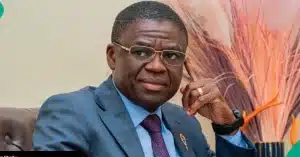The Chief Executive Officer of the West Indian Ocean Cable Company (WIOCC), Chris Wood, has refuted speculations making the rounds following recent massive internet disruption in Nigerian and other African countries over an undersea cable cut.
Naija News recalls that weeks ago, there were lamentations across the board after millions of people could not access the internet, affecting many business operations.
Various theories have circulated in the media regarding the condition of the damaged cables that caused significant disruptions in internet operations.
One of these theories suggests that the cables may never be repaired again, as they have exceeded their expected lifespan and were likely severed as a result.
However, Chris Wood, in a statement issued on Tuesday, refuted these speculations, clarifying that none of the four affected cables have reached the end of their operational life.
Wood explained that cable cuts are relatively common worldwide and are often caused by factors such as a ship’s anchor, subsea landslides, seismic events like earthquakes, and other similar incidents.
Furthermore, he disclosed that repair efforts are currently underway, although he did not provide specific details regarding the timeline for completion or the associated costs.
“There’s very limited capability to restore those networks at this time because there isn’t the same level of network diversity. We’re working with our partners to land Equiano in Ghana, and we’re working with the government and regulator there to acquire the correct licenses and everything to bring Equiano into Ghana, hopefully, that will be done as fast as possible, and any future events like this will have a smaller impact.
“And in terms of the impact on other countries, there are different levels of impact felt by different countries. Equiano lands in Nigeria, so there are restoration opportunities here. It lands in Togo, so there’s restoration opportunity in Togo, but it doesn’t land in Ghana, for example, or Code d’Ivoire.
“One of the reasons these cuts have had such a significant impact is that four or five weeks ago, three cables were cut in the Red Sea, which also serves Africa.
“So, if there hadn’t been the Red Sea cuts, a lot more of the traffic could have been restored going south from Nigeria around South Africa and back up the Red Sea. So this incident has been compounded by the cuts in the Red Sea,” Vanguard quoted Wood saying in a publication.
According to Wood, it will cost millions of dollars to repair the damaged cables.
“It’s millions of dollars, maybe between $1million and $2million per cable, depending on how long it takes the ship to find the cable and repair it.
“I can’t say exact figures because it depends on the nature of the cuts; how long it takes to repair them, but it’s when you look at the four systems together it is several, several millions of dollars,” he said.
Wood mentioned that in order to reduce risks and prevent future incidents, WIOCC has made a significant investment in a new cable known as 2 Africa.
Naija News understands that the cable is currently being installed and is set to connect Lagos and Akwa Ibom. It can transmit data in both directions, offering more than two additional layers of backup.
Therefore, in case the northern part of the cable is damaged, it can still support traffic from the southern region.
The post Fresh Update Emerges On Undersea Cable Cut That Caused Massive Internet Disruptions In Nigeria, Other African Countries appeared first on Naija News.






